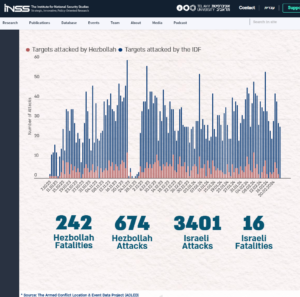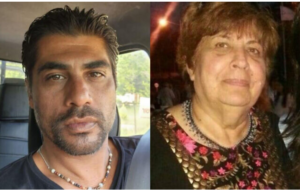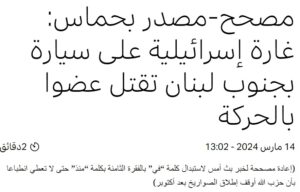March 20 UPDATE:
Reuters Corrects in English, Arabic
Reuters has corrected its reporting both in English and Arabic to state that "Hezbollah launched rockets at Israel since October," as opposed to "in October." See below for a detailed update.
In their March 13 Reuters article, reporters Maya Gebeily, Laila Bassam and Henriette Chacar turn Hezbollah rocket attacks against Israel into a thing of the past, something that last happened months ago, as opposed to that very same morning. Concealing continuing and current Hezbollah rocket attacks against Israel, the trio misled ("Israeli strike in south Lebanon kills Hamas member"):
Lebanese armed group Hezbollah launched rockets at Israel in October in support of Hamas. Since then, Israel has been carrying out strikes in Lebanon, mostly confined to the border region but increasingly spreading further north and east.
 Hezbollah launched rocket attacks against Israel not only "in" October, but also countless days since October, including the very day of the report. That morning, at 10:13, Hezbollah launched a rocket towards Hanita, in northern Israel. The previous morning, the terror organization boasted about firing 100 rockets at Israel. In recent days, Hezbollah's attacks have been incessant.
Hezbollah launched rocket attacks against Israel not only "in" October, but also countless days since October, including the very day of the report. That morning, at 10:13, Hezbollah launched a rocket towards Hanita, in northern Israel. The previous morning, the terror organization boasted about firing 100 rockets at Israel. In recent days, Hezbollah's attacks have been incessant.  Alongside the rocket attacks, Hezbollah drone and deadly anti-tank attacks have continued regularly until March 13 (and since, with the most recent rocket attack targeting Shtula, Shumra, Zarit and Even Menachem as these words are written, at 5:15 am ET, March 17). The Institute for National Security Studies details (screenshot at left) Hezbollah's daily attacks against Israeli targets through Feb. 20 (along with IDF strikes against Hezbollah). Indeed, there have been many, many more Hezbollah attacks against Israel, rockets and otherwise, since October than in October. Daily reports detailing Hezbollah attacks on Israel are also available at the Meir Amit Intelligence and Terrorism Information Center, and are updated (as of this writing) until March 14.
Alongside the rocket attacks, Hezbollah drone and deadly anti-tank attacks have continued regularly until March 13 (and since, with the most recent rocket attack targeting Shtula, Shumra, Zarit and Even Menachem as these words are written, at 5:15 am ET, March 17). The Institute for National Security Studies details (screenshot at left) Hezbollah's daily attacks against Israeli targets through Feb. 20 (along with IDF strikes against Hezbollah). Indeed, there have been many, many more Hezbollah attacks against Israel, rockets and otherwise, since October than in October. Daily reports detailing Hezbollah attacks on Israel are also available at the Meir Amit Intelligence and Terrorism Information Center, and are updated (as of this writing) until March 14.
Mother and son Barak (left) and Miri Ayalon killed by Hezbollah fire at home in Kfar Yuval, Jan. 14 (Courtesy, via Times of Israel)
March 20 Update: Reuters Corrects in English, Arabic
In the English-language version of the article, Reuters editors have issued a stealth correction, revising the text to state that "Hezbollah has launched rockets at Israel since October," as opposed to in October. Contrary to standard practice, editors did not append a correction alerting readers to the change. The Arabic version of Reuters' article is likewise corrected to refer to rockets "since October," and a correction at the top of the article notes:
This report from yesterday has been corrected to replace the word "in" in the 8th paragraph with the word "since" to avoid giving the impression that Hezbollah stopped firing rockets after October. [Translation by CAMERA Arabic.]

